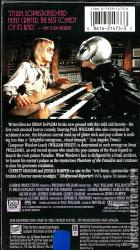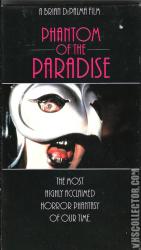Phantom of the Paradise
Catalog Number
1473
-
Primary Distributor (If not listed, select "OTHER")
Catalog Number
1473
Primary Distributor (If not listed, select "OTHER")
Release Year
Country
N/A (NTSC)
N/A | N/A | N/A
N/A | N/A
Phantom of the Paradise (1974)
Additional Information
Additional Information
"He sold his soul for rock-n-roll," read the tagline for Brian De Palma's satirical Phantom of the Opera for the '70s rock scene. After hearing Winslow Leach (William Finley) perform a song from his Faust rock opera, Phil Spector-ish impresario Swan (Paul Williams) decides that Winslow's opera would be the perfect debut attraction for his new rock palace, the Paradise. Swan steals the music and has Winslow imprisoned -- but not before Winslow meets aspiring songbird Phoenix (Jessica Harper). Jumping prison, Winslow breaks into Swan's Death Records factory to ruin the recordings, but a record press accident grossly disfigures him. Winslow then sneaks into the Paradise to sabotage Swan's show, disguising himself as the Phantom. Swan, however, cuts a deal with the Phantom to finish his cantata; he promises that Phoenix will sing it but then reneges, hiring prissy glam rocker Beef (Gerritt Graham). Determined to have Phoenix sing, the Phantom soon discovers just how far Swan will go to give the people what they want.
The record press in which Winslow character was disfigured was a real pressing plant (an injection-molding press at Pressman Toys). He was worried about whether the machine would be safe, and the crew assured that it was. The press was fitted with foam pads (which resemble the casting molds in the press), and there were chocks put in the center to stop it from closing completely. Unfortunately, the machine was powerful enough to crush the chocks and it gradually kept closing. Finley was pulled out in time to avoid injury.
The "electronic room" in which Winslow composes his cantata (and where Swan restores his voice) is in fact the real-life recording studio, The Record Plant. The walls covered with knobs are in reality an oversize custom-built electronic synthesizer dubbed TONTO, which still exists to this day.
The "Paradise" concert scenes were filmed at the Majestic Theater in Dallas, Texas. The "extras" in the audience had responded to an open cattle call for locals interested in being in the film.
Sissy Spacek was the film's set dresser, assisting her then-boyfriend-now-husband Jack Fisk, the film's production designer. She would later star in De Palma's Carrie in 1976.
Swan's record label in the film was originally to be called "Swan Song", but this was abandoned due to the existence of Led Zeppelin's label of the same name in real life. Swan's label in the film became Death Records. In the scene where Swan holds a press conference to introduce Beef, the Death Records logo is superimposed over a Swan Song sign on the speaker's podium. A sign featuring the original unedited Swan Song logo can be seen in several scenes from within the Paradise including a towel Beef is wearing when he is getting into the shower on opening night, the tape player Winslow/The Phantom uses to discover Swan's secret deal on the night of his wedding to Phoenix, and several brief shots of signs within The Paradise.
A novelization of the film was written by Bjarne Rostaing. Apparently based on an early draft of the screenplay, the novel excludes the supernatural angle of the film.
The record press in which Winslow character was disfigured was a real pressing plant (an injection-molding press at Pressman Toys). He was worried about whether the machine would be safe, and the crew assured that it was. The press was fitted with foam pads (which resemble the casting molds in the press), and there were chocks put in the center to stop it from closing completely. Unfortunately, the machine was powerful enough to crush the chocks and it gradually kept closing. Finley was pulled out in time to avoid injury.
The "electronic room" in which Winslow composes his cantata (and where Swan restores his voice) is in fact the real-life recording studio, The Record Plant. The walls covered with knobs are in reality an oversize custom-built electronic synthesizer dubbed TONTO, which still exists to this day.
The "Paradise" concert scenes were filmed at the Majestic Theater in Dallas, Texas. The "extras" in the audience had responded to an open cattle call for locals interested in being in the film.
Sissy Spacek was the film's set dresser, assisting her then-boyfriend-now-husband Jack Fisk, the film's production designer. She would later star in De Palma's Carrie in 1976.
Swan's record label in the film was originally to be called "Swan Song", but this was abandoned due to the existence of Led Zeppelin's label of the same name in real life. Swan's label in the film became Death Records. In the scene where Swan holds a press conference to introduce Beef, the Death Records logo is superimposed over a Swan Song sign on the speaker's podium. A sign featuring the original unedited Swan Song logo can be seen in several scenes from within the Paradise including a towel Beef is wearing when he is getting into the shower on opening night, the tape player Winslow/The Phantom uses to discover Swan's secret deal on the night of his wedding to Phoenix, and several brief shots of signs within The Paradise.
A novelization of the film was written by Bjarne Rostaing. Apparently based on an early draft of the screenplay, the novel excludes the supernatural angle of the film.
Related Links
Related Releases2
Catalog Number
1473
Primary Distributor (If not listed, select "OTHER")
Phantom Of The Paradise (1974)
Release Year
Catalog Number
1473
Primary Distributor (If not listed, select "OTHER")
Catalog Number
1473
Catalog Number
1473
Primary Distributor (If not listed, select "OTHER")
Phantom of the Paradise (1974)
Release Year
Catalog Number
1473
Primary Distributor (If not listed, select "OTHER")
Catalog Number
1473












Comments0
Login / Register to post comments